A lease is a contract between a landlord and tenants. Joint tenancies are contracts in where all the tenants are party to one tenancy agreement. This means that you are responsible for your own rent and responsibilities stated in the agreement but you are also responsible all of the other tenant’s rent and responsibilities.
Can one person break a two or more person lease?
No, one person in the tenancy usually cannot break the agreement. If you wish to end the agreement, you will have to give written notice to the landlord. This should be your first option if you and your co-tenant unexpectedly move out. However, the landlord is within their rights to refuse to let you break the lease and fully enforce the contract against you or your co-tenant.
Can I remove my name from a joint lease?
Usually, you cannot remove your name from a joint tenancy unless your landlord agrees to this arrangement or there is a provision in the agreement that allows you to do so. Most joint tenancy agreements contain a provision that you are “jointly and severally liable.” This means that if the person or people you are living with decide to leave, you are liable for the entire rent until the agreement expires.
What if my co-tenant causes damage that I shouldn’t be responsible for?
Joint liability includes not only rent, but damage. Therefore, if your joint tenant causes damage to the property, your landlord can use money from your security deposit to cover the damages. If the damage is substantial and exceeds the amount of the deposits, the landlord can recover their damages against all of the tenants.
Should I sue my co-tenant?
You could sue your co-tenant to recover. However, since lawsuits could be expensive, you should consider what you are entitled to recover in addition to the cost of taking legal action. You should speak to an attorney to understand your rights and what you can expect to recover.
Before signing a joint tenancy, you should consider the risks and available alternatives to you. A joint-tenancy can be have risk because you are liable for most actions that your joint tenant does that breaks the lease. One way to possibly avoid this risk is to form a separate contract with your joint-tenant that stipulates what happens when the other breaks the lease.


